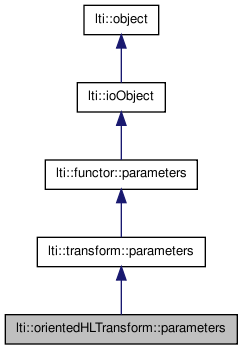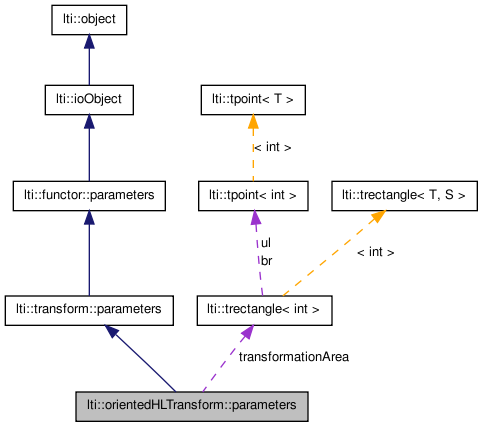

|
latest version v1.9 - last update 10 Apr 2010 |
|
the parameters for the class orientedHLTransform More...
#include <ltiOrientedHLTransform.h>


Public Types | |
| enum | eAccumulationMode { Classic, Gradient } |
Public Member Functions | |
| parameters () | |
| parameters (const parameters &other) | |
| ~parameters () | |
| const char * | getTypeName () const |
| parameters & | copy (const parameters &other) |
| parameters & | operator= (const parameters &other) |
| virtual functor::parameters * | clone () const |
| virtual bool | write (ioHandler &handler, const bool complete=true) const |
| virtual bool | read (ioHandler &handler, const bool complete=true) |
Public Attributes | |
| trectangle< int > | transformationArea |
| int | baseValue |
| int | accuracy |
| int | range |
| eAccumulationMode | accumulationMode |
the parameters for the class orientedHLTransform
Accumulation modes.
| Classic |
A value of 1 will be accumulated in the hough space each time an edge is found with a value greater than baseValue. |
| Gradient |
The value in the given edges image will be accumulated allowing to weight the strongness of an edge. If the edges image is a channel, their values will be multiplied by 255 before accumulating. |
| lti::orientedHLTransform::parameters::parameters | ( | ) |
default constructor
Reimplemented from lti::transform::parameters.
| lti::orientedHLTransform::parameters::parameters | ( | const parameters & | other | ) |
copy constructor
| other | the parameters object to be copied |
Reimplemented from lti::transform::parameters.
| lti::orientedHLTransform::parameters::~parameters | ( | ) | [virtual] |
destructor
Reimplemented from lti::functor::parameters.
| virtual functor::parameters* lti::orientedHLTransform::parameters::clone | ( | ) | const [virtual] |
returns a pointer to a clone of the parameters
Reimplemented from lti::transform::parameters.
| parameters& lti::orientedHLTransform::parameters::copy | ( | const parameters & | other | ) |
copy the contents of a parameters object
| other | the parameters object to be copied |
Reimplemented from lti::transform::parameters.
| const char* lti::orientedHLTransform::parameters::getTypeName | ( | ) | const [virtual] |
returns name of this type
Reimplemented from lti::transform::parameters.
| parameters& lti::orientedHLTransform::parameters::operator= | ( | const parameters & | other | ) |
copy the contents of a parameters object
| other | the parameters object to be copied |
| virtual bool lti::orientedHLTransform::parameters::read | ( | ioHandler & | handler, | |
| const bool | complete = true | |||
| ) | [virtual] |
read the parameters from the given ioHandler
| handler | the ioHandler to be used | |
| complete | if true (the default) the enclosing begin/end will be also written, otherwise only the data block will be written. |
Reimplemented from lti::functor::parameters.
| virtual bool lti::orientedHLTransform::parameters::write | ( | ioHandler & | handler, | |
| const bool | complete = true | |||
| ) | const [virtual] |
write the parameters in the given ioHandler
| handler | the ioHandler to be used | |
| complete | if true (the default) the enclosing begin/end will be also written, otherwise only the data block will be written. |
Reimplemented from lti::functor::parameters.
mode used for the accumulation
Default: Classic
Accuracy of Hough Line Transformation.
Determines what kind of line angles can be detected. The following values are allowed:
Higher values that are divisible by 180 are also allowed, but do make the transformation _really_ slow.
Default value: 180
All points of the input image/channel whose value is greater than the base value are used for transformation.
(usually the base value will be 0 (or a little higher) which results in all coloured lines being considered on a black background)
For channels (with float values), the comparison value will be baseValue/255.0.
Default Value: 0
Angle range.
The sinusoids are only be drawn from (gradientAngle-range) to (gradientAngle+range). Values lower than 5 are not recommended.
Default value is 10.
Part of the input image/channel that will be considered for transformation.
If this area is bigger than the image/channel size given in the apply() method, the size of the channel will be used.
The default values are (0,0, std::numeric_limits<int>::max(), std::numeric_limits<int>::max()) (i.e. use the whole image)